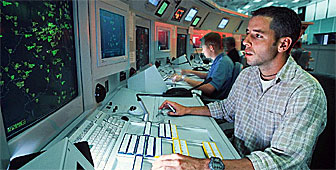German controllers tried to alert Swiss before crash

German aviation officials say they tried to warn Swiss controllers ahead of last week's mid-air collision that left 71 people dead.
German controllers in the southern city of Karlsruhe say they telephoned the Zurich control tower – which was directing the two planes – two minutes before the fatal accident but could not get through because the only available line was busy.
Axel Raab, spokesman for the Karlsruhe control centre, said staff tried to get in touch with Skyguide’s lone controller after receiving an automatic radar warning that the Russian Tupolev 154 passenger jet and the DHL Boeing 757 cargo were on a collision course over southern Germany.
At the time, the Swiss controller was using a back-up line while routine maintenance work was being carried out by on the main telephone system according to the German Federal Bureau of Aircraft Accidents Investigations (BFU).
Technical problems
German investigators said the lone air traffic controller on duty in Zurich when the two planes collided in mid-air on Monday was battling with technical problems.
They said on Friday that Skyguide was working on its telephone and radar systems on the night that the two aircraft slammed into each other at 11,000 metres above Lake Constance.
The revelation has added weight to growing criticism of the role of Skyguide, the Swiss air traffic control agency, in the disaster, which left 71 people, including 45 children, dead.
According to the Germans, Skyguide’s air traffic controller was not only without his main telephone line, but around the same time Skyguide’s radar data processing system momentarily went out of action.
The problems meant the air traffic controller was simultaneously monitoring two frequencies and two radar monitors.
Control system discrepancies
Between 2325 and 2333, the air traffic controller repeatedly attempted to contact an aircraft that was landing at the German port of Friedrichshafen.
Shortly afterwards, at 2334, the controller made contact with the Tupolev – just 44 seconds before it collided.
The Russian pilot began to lose altitude 30 seconds prior to impact – around the same time as the Boeing pilot began to initiate a descent after his in-flight warning system warned of the oncoming Tupolev.
Funerals
Meanwhile, thousands of people turned out to pay an emotional farewell on Monday to the children who died in the crash.
Crowds thronged the airport at Ufa, capital of Russia’s Bashkortostan region where most of the victims came from, as the remains of 22 children and 11 adults were flown in from Germany.
swissinfo with agencies

In compliance with the JTI standards
More: SWI swissinfo.ch certified by the Journalism Trust Initiative
You can find an overview of ongoing debates with our journalists here. Please join us!
If you want to start a conversation about a topic raised in this article or want to report factual errors, email us at english@swissinfo.ch.